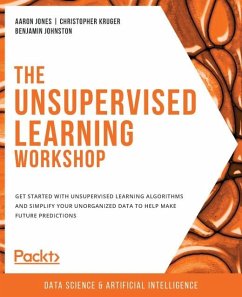Learning how to apply unsupervised algorithms on unlabeled datasets from scratch can be easier than you thought with this beginner's workshop, featuring interesting examples and activitiesKey FeaturesGet familiar with the ecosystem of unsupervised algorithmsLearn interesting methods to simplify large amounts of unorganized dataTackle real-world challenges, such as estimating the population density of a geographical areaBook DescriptionDo you find it difficult to understand how popular companies like WhatsApp and Amazon find valuable insights from large amounts of unorganized data? The Unsupervised Learning Workshop will give you the confidence to deal with cluttered and unlabeled datasets, using unsupervised algorithms in an easy and interactive manner.The book starts by introducing the most popular clustering algorithms of unsupervised learning. You'll find out how hierarchical clustering differs from k-means, along with understanding how to apply DBSCAN to highly complex and noisy data. Moving ahead, you'll use autoencoders for efficient data encoding.As you progress, you'll use t-SNE models to extract high-dimensional information into a lower dimension for better visualization, in addition to working with topic modeling for implementing natural language processing (NLP). In later chapters, you'll find key relationships between customers and businesses using Market Basket Analysis, before going on to use Hotspot Analysis for estimating the population density of an area.By the end of this book, you'll be equipped with the skills you need to apply unsupervised algorithms on cluttered datasets to find useful patterns and insights.What you will learnDistinguish between hierarchical clustering and the k-means algorithmUnderstand the process of finding clusters in dataGrasp interesting techniques to reduce the size of dataUse autoencoders to decode dataExtract text from a large collection of documents using topic modelingCreate a bag-of-words model using the CountVectorizerWho this book is forIf you are a data scientist who is just getting started and want to learn how to implement machine learning algorithms to build predictive models, then this book is for you. To expedite the learning process, a solid understanding of the Python programming language is recommended, as you'll be editing classes and functions instead of creating them from scratch.
Dieser Download kann aus rechtlichen Gründen nur mit Rechnungsadresse in A, B, BG, CY, CZ, D, DK, EW, E, FIN, F, GR, HR, H, IRL, I, LT, L, LR, M, NL, PL, P, R, S, SLO, SK ausgeliefert werden.


